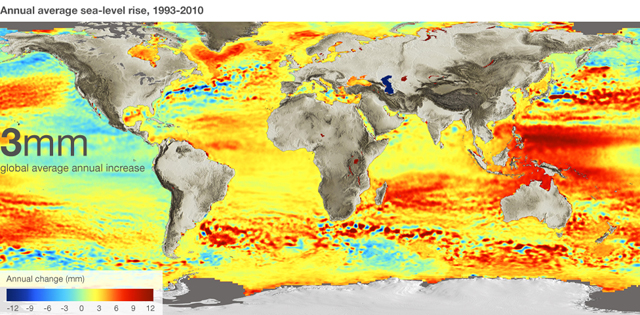Search
Recent comments
- impeached?....
4 hours 37 min ago - 100.....
12 hours 50 min ago - epibatidine....
18 hours 41 min ago - cryptohubs...
19 hours 40 min ago - jackboots....
19 hours 48 min ago - horrid....
19 hours 56 min ago - nothing....
22 hours 19 min ago - daily tally....
23 hours 41 min ago - new tariffs....
1 day 1 hour ago - crummy....
1 day 19 hours ago
Democracy Links
Member's Off-site Blogs
the rise of sea levels...

A major reassessment of 18 years of satellite observations has provided a new, more detailed view of sea-level change around the world.
Incorporating the data from a number of spacecraft, the study re-affirms that ocean waters globally are rising by just over 3mm/yr.
But that figure, according to the reassessment, hides some very big regional differences - up and down.
The Philippine Sea, for example, has seen increases in excess of 10mm/yr.
Part of that signal reflects the great fluctuation in winds and sea-surface temperature across the Pacific Ocean known as the El Nino/La Nina-Southern Oscillation.
"The trend map is really a way of looking at average field changes over the 20 years," explained Steven Nerem of the University of Colorado, US.
"The places where you see high trends probably won't have high trends in another 20 years.
"A lot of this is decadal variability that will average out over the longer time series, which is why we need more missions to understand where this variability is."
Paolo Cipollini from the UK's National Oceanography Centre added: "Many of the features in the trend map correspond to long-term variations in the ocean currents."
http://www.bbc.co.uk/news/science-environment-19702450
Of course this points to a rise of at least 30 centimetres by the end of this century on this trend alone. This also represents an enormous amount of energy that has been absorbed by the oceans, mostly through warming... With the compounding effect of this trend and other factors including the land ice melt (Greenland, Antarctica), Gus can predict a rise of sea levels between 90 centimetres to 2 metres by 2100...
And to all the Janet Albretchsens and Jo Novas out there, start to open your eyes and let your brains see the scientifically measured evidence, without trying to cook the results to your denialist sauce...
Note the reverse trend in land-locked seas, where evaporation is far more active than expansion due to warming...
- By Gus Leonisky at 25 Sep 2012 - 7:38am
- Gus Leonisky's blog
- Login or register to post comments
take action now...
NRDC is the nation's most effective environmental action group [USA], combining the grassroots power of 1.3 million members and online activists with the courtroom clout and expertise of more than 350 lawyers, scientists and other professionals.
The New York Times calls us "One of the nation's most powerful environmental groups." The National Journal says we're "A credible and forceful advocate for stringent environmental protection."
Our dedicated staff work with businesses, elected leaders, and community groups on the biggest issues we face today. Our priorities include:
- Curbing Global Warming and Creating the Clean Energy Future
- Reviving the World's Oceans
- Defending Endangered Wildlife and Wild Places
- Protecting Our Health by Preventing Pollution
- Ensuring Safe and Sufficient Water
- Fostering Sustainable Communities
http://www.nrdc.org/about/rise of the seas...
The sea level on the east coast of the US is rising five times faster than the global average.
The prospect of flooding is a major threat to millions of people who live in the region.
Scott Heidler reports from a small community in the state of Delaware, which has found itself on the front line of the problem.
http://www.aljazeera.com/news/americas/2012/10/2012101531618962655.html
weird and recordest...
The UK has experienced its "weirdest" weather on record in the past few months, scientists say.
The driest spring for over a century gave way to the wettest recorded April to June in a dramatic turnaround never documented before.
The scientists said there was no evidence that the weather changes were a result of Man-made climate change.
But experts from three bodies warned the UK must plan for periodic swings of drought conditions and flooding.
The warning came from the Environment Agency, Met Office and Centre for Ecology & Hydrology (CEH) at a joint briefing in London.
Terry Marsh, from the CEH, said there was no close modern precedent for the extraordinary switch in river flows. The nearest comparison was 1903 but this year was, he said, truly remarkable.
What was also remarkable - and also fortunate - was that more people did not suffer from flooding. Indeed, one major message of the briefing was that society has been steadily increasing its resilience to floods.
Paul Mustow, head of flood management at the Environment Agency, told BBC News that 4,500 properties had been flooded this year.
"But if you look back to 2007 when over 55,000 properties were flooded, we were relatively lucky - if lucky is the right word - for the impacts we saw this summer," he said.
"The rainfall patterns affected different areas - and also there were periods of respite between the rain which lessened the impact."
http://www.bbc.co.uk/news/science-environment-19995084